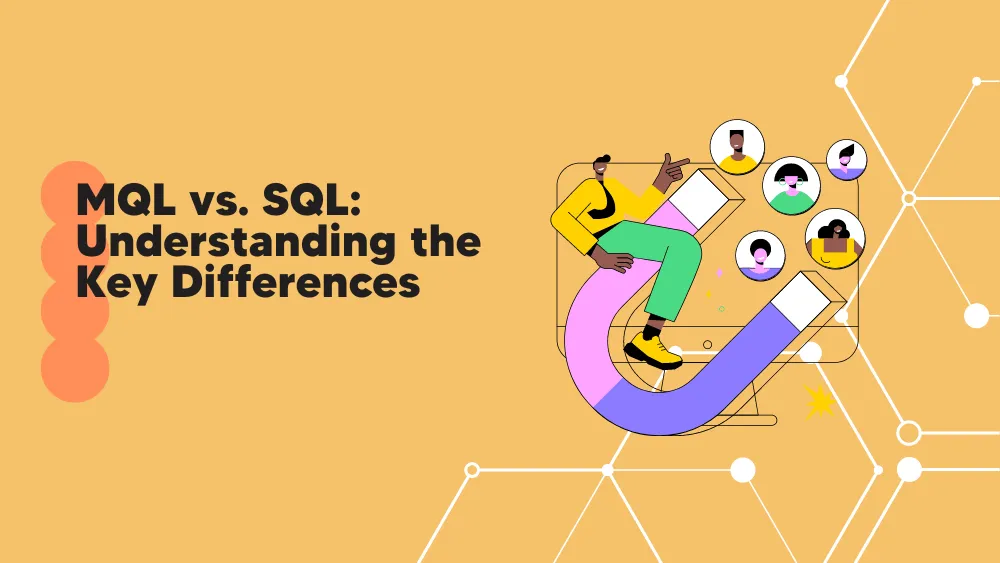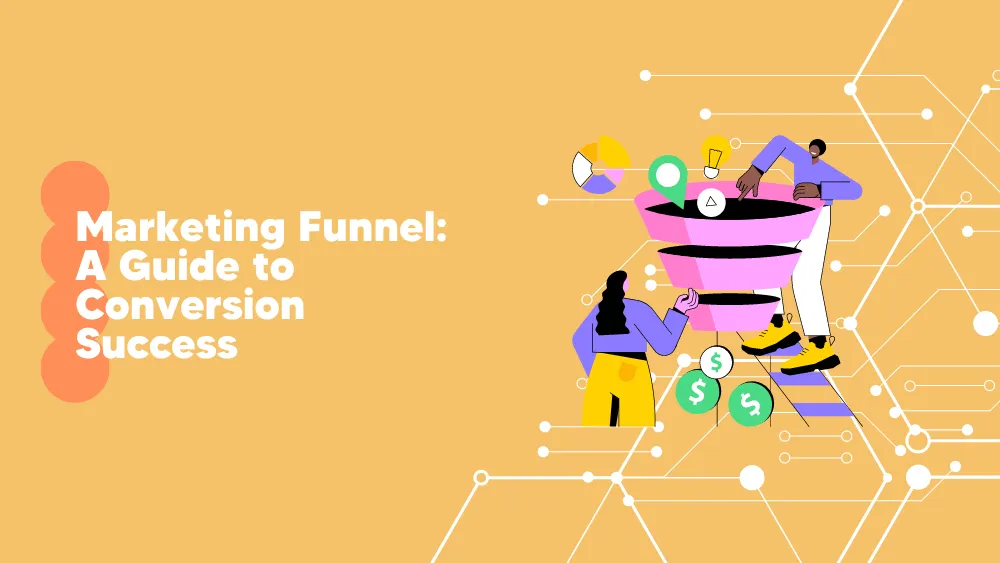Lead generation is the name of the business game, and in the discussion of MQL vs. SQL, these two acronyms represent stages in the sales funnel that help companies filter the crowd and find potential customers.
MQLs, or Marketing Qualified Leads, are those contacts who’ve shown some interest in the company’s offerings but are not quite ready to receive a sales call. They’ve interacted with the business, yes, and they’ve shown interest, indeed. But are they ready to whip out their credit cards? Probably not just yet.
Conversely, SQLs, or Sales Qualified Leads, are a few steps ahead. They are the contacts who’ve crossed the line from “just interested” to “ready to talk business”.
They’re the ones who’ve been examined, qualified, and given the green light by both marketing and sales teams. Spotting the difference between MQLs and SQLs can be a bit of a puzzle, but it’s a game worth playing. Recognizing these distinctions optimizes marketing efforts and sales strategies, ensuring resources are spent wisely, and opportunities aren’t missed. It’s the secret ingredient to making the sales process smoother, faster, and more effective.
The question remains, why bother with these labels? Misidentifying a lead could lead to wasted time, misused resources, and missed opportunities. It’s like setting off to reach the top of Mount Everest without understanding the climbing stages – it could be done, but it’d be messy and inefficient. So, this article will shed light on these elusive terms, whether seasoned sales veteran, a marketing newbie, or just someone trying to decipher the sales and marketing lexicon.
What is MQL?
A Marketing Qualified Lead, known to friends as MQL, is someone who’s gone from being just a random contact to showing genuine interest in a company’s products or services. They’ve stepped up from browsing through a catalog to trying on clothes.
Getting a lead to the MQL stage needs time, the right approach, and a bit of expertise. In marketing terms, it’s about nurturing and engaging with the leads, understanding what they need, and providing just that. Knowing who your MQLs are equating to having a roadmap for your marketing strategy. It’s all about making informed decisions that are most likely to bring results. Here’s why it’s so important:
- Prioritization: Identifying MQLs allows you to determine where to focus your efforts. Instead of throwing everything at the wall and seeing what sticks, you can direct your resources towards those who have shown genuine interest in your product or service.
- Personalization: When you know who your MQLs are, you can tailor your content to meet their specific needs and interests. This enhances their experience with your brand and increases the likelihood of converting them into customers.
- Efficiency: Understanding your MQLs can lead to increased marketing efficiency. By focusing on it, you can reduce wasted effort on low-interest leads and enhance return on investment.
- Predictability: MQLs offer some degree of predictability. They help you understand patterns and trends in your customer journey, allowing you to make more accurate predictions about future sales performance.
What is SQL?
What is Sales Qualified Lead, or SQLs, as they’re commonly known as you may ask? Simply put, they are the next big step in the sales funnel. If MQLs are folks who’ve shown interest in your product, SQLs are those who’ve gone a step further. They’ve not just tried on the clothes; they’re checking the price tag and asking about different sizes.
So, what separates an SQL from an MQL? Picture this: An MQL says, “Interesting, tell me more about this product,” while SQL states, “I’m interested in buying this product. What’s the next step?” It’s a difference in readiness to make a purchase, and that distinction is crucial for the sales process.
Identifying an SQL is a case of looking at actions and judging their readiness to whip out the wallet. Are they asking about pricing details or discussing specific requirements? If yes, congratulations; you’ve likely got an SQL on your hands!
Getting an MQL to evolve into an SQL is not a walk in the park, and it needs effective lead qualification and persistent sales efforts. But if done right, it can significantly boost your conversion rates and give your revenue a serious leg up.
MQL vs. SQL – Key Differences
Lead Qualification Criteria: Two Sides of the Same Coin
While MQLs are keenly interested in your product or service, they might not yet be ready to buy. They’ve downloaded your eBook or signed up for the newsletter, suggesting they’re open to learning more. On the flip side, SQLs have moved beyond the casual interest stage. They’ve contacted your sales team, asked for a product demo, or requested pricing information. In short, they’re closer to making a purchase decision.
The Art of Lead Scoring: Numbers Tell the Tale
Another significant difference between MQLs and SQLs lies in their behavior. MQLs typically engage with more exploratory, top-of-the-funnel content, like blogs or webinars. They’re looking for information and establishing a connection with your brand. SQLs, however, engage with bottom-of-the-funnel content, such as pricing pages or product demos. They’re beyond the point of casual browsing – they’re actively considering your offering to meet their needs.
Here, lead scoring and behavior tracking are our best friends. Have they opened your emails, clicked through your website, or shared your content? All these actions accumulate a lead score. An MQL has a good score, showing they’re interested, but when that score gets high enough—meaning they’re showing signs they’re ready to buy—they transform into an SQL.
Dividing Responsibilities: Marketing and Sales Tag Team
Marketing people take the lead (pun not intended) with MQLs. They generate and nurture these leads with top-notch content, targeted campaigns, and seamless customer experiences. The sales team steps in when an MQL shows buying signals and moves closer to a purchase decision. They take over the SQLs, working on closing the deal with more direct and personalized communication. It’s a handoff of responsibilities from marketing to sales.
Aligning Marketing and Sales: The MQL-SQL Impact
The journey from MQL to SQL is pivotal in aligning marketing and sales. It creates a clear delineation of responsibilities and establishes a smooth handover process. The marketing team knows its job is to nurture and qualify leads, while sales focus on closing the deals with those ready to buy. This clear division of labor not only boosts efficiency but can also improve the overall performance of your sales funnel.
The Importance of MQLs and SQLs in Lead Nurturing
The Role of MQLs – Establishing Connections
MQLs are like those conversations at the start of a new friendship – you’re getting to know each other, finding common interests, and building a relationship. In marketing terms, this is when your content is doing the heavy lifting. Your blogs, webinars, newsletters, and other educational content make an impression on your MQLs, drawing them closer to your brand. These efforts are not about making a quick sale but building trust, fostering relationships, and establishing your brand as a reliable source of valuable information.
The Role of SQLs – Sealing the Deal
SQLs are more like those intense conversations that seal the deal on a new partnership or venture – there’s a tangible intent to move forward. In the sales process, SQLs represent leads ready for direct sales contact. They have shown significant interest and intent, and it’s time for the sales team to swoop in and close the deal. The nurturing doesn’t stop here; it takes on a more direct, transactional form.
Segmentation and Personalization – Creating Tailored Experiences
Both MQLs and SQLs play a crucial role in customer segmentation. Knowing where a lead is in the sales funnel allows for more personalized marketing efforts. For MQLs, this could mean targeted content based on their interests and engagement. For SQLs, it could mean personalized product demonstrations or tailored sales pitches. This level of personalization can enhance the user experience, and it’s all thanks to the distinction between MQLs and SQLs.
So, while MQLs and SQLs might seem like just another layer of complexity in the marketing and sales world, they’re integral to successful lead nurturing. Understanding and distinguishing between these two types of leads can help craft more effective marketing and sales strategies, ultimately leading to higher conversion rates and happier customers. And that’s what we’re all here for, right?
Maximizing the Benefits of MQLs and SQLs
Optimizing Lead Generation – All About the Balance
Balancing your attention between MQLs and SQLs is essential for optimizing lead generation. Nurture your MQLs with valuable content, personalized experiences, and well-timed interactions to help them glide smoothly down the sales funnel. But don’t forget to be ready for when they shift into SQL territory – have your sales team primed and prepared to dive in and seal the deal.
The Power of Marketing Automation Tools – Let Technology Do the Heavy Lifting
Marketing automation tools, such as Hubspot, Marketo, Pardot, or Mailchimp, can be a lifesaver when it comes to managing MQLs and SQLs. They can track user behavior, monitor engagement, automate email campaigns, and even score leads based on their interactions with your brand. This automated insight can help qualify leads and free up your time to focus on crafting more personalized and engaging content.
Continuous Communication and Feedback – A Two-Way Street
Marketing and sales are two sides of the same coin, and they need to work in harmony to maximize the benefits of MQLs and SQLs. Regular communication and feedback between these two teams are essential. Sales need to inform marketing about the needs and challenges of SQLs, and marketing needs to provide sales with insights into MQL behavior and interests. This mutual exchange of information can help fine-tune strategies and create a seamless transition for leads from one stage to the next.
Conclusion
Our journey through the bustling world of lead generation has brought us across acronyms galore, and if you’re feeling a bit dizzy, you’re not alone. Let’s recap this lively soiree and hit the highlights one more time:
MQLs, or Marketing Qualified Leads, are those who’ve shown a keen interest in what your company’s got on display but aren’t quite ready to hand over their hard-earned cash. They’re in the relationship-building phase, enjoying your content and learning more about your brand.
Then we have SQLs, or Sales Qualified Leads, who are practically pulling out their credit cards. They’re hot on the trail of making a purchase, having demonstrated readiness to take the leap and become paying customers.
The differences between MQLs and SQLs aren’t just fancy marketing talk; they hold the key to efficient and effective lead generation. When you know who’s who in your sales funnel, you can create a finely tuned, personalized approach that gently nudges MQLs along their journey, turning them into SQLs ready for your sales team to swoop in and clinch the deal.
On the surface, it might seem like a complex game of tag, but with understanding and a keen eye for detail, this dance between MQLs and SQLs becomes a well-choreographed routine that keeps your sales process humming along like a well-oiled machine.





